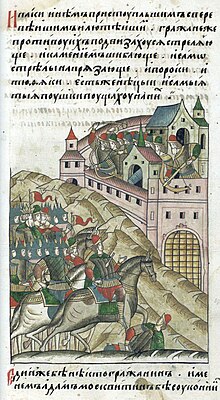Tokhtamysh
| Tokhtamysh | |
|---|---|
| Khan Shahanshah |
|

Tokhtamysh and the armies of the Golden Horde rally in front of Moscow, 1382.
|
|
| Reign | 1380-1395 |
| Coronation | 1378 |
| Predecessor | Urus Khan, Mamai |
| Successor | Edigu |
| Born | White Horde |
| Died | 1406 Tyumen |
| House | Borjigin |
| Dynasty | Golden Horde |
| Religion | Islam |
Tokhtamysh (tat. Tuqtamış) or Tokhtamısh (died 1406) was the prominent khan of the Blue Horde, who briefly unified the White Horde and Blue Horde subdivisions of the Golden Horde into a single state. He was a descendant of Genghis Khan's grandson, Tuqa-Timur.
Tokhtamysh appears in history in 1376, trying to overthrow his uncle Urus Khan, ruler of the White Horde, and fleeing to the great Timur. Tokhtamysh outlived Urus and both his sons, and forcefully ascended to the throne of the White Horde in 1378, with Timur's backing.
Tokhtamysh dreamed of emulating his ancestors and made plans to reunite the Golden Horde. In 1380, he invaded the Blue Horde by fording across the Volga, and defeated Mamai during the Second Battle of the Kalka River. The ruler of the Blue Horde, Mamai, was killed shortly after the Battle of Kulikovo, marking Tokhtamysh's victory and the reunification of the Golden Horde.
Having reunited the Blue and White Hordes into the Golden Horde, in 1382, Tokhtamysh led a successful campaign against Russia as a punishment for the Kulikovo defeat - setting back, though not ending, the Russian aspiration to free themselves of Tatar rule. In just six years, Tokhtamysh had reunified the lands of the Golden Horde from Crimea to Lake Balkhash.
Dmitry Donskoy had raised a large army to defeat and suppress the Mongol–Tatar hordes, and, after defeating Mamai during the Battle of Kulikovo, could not raise another army against Tokhtamysh Khan. Realizing the enmity the unruly Dimitry had unleashed, Tokhtamysh marched against Moscow.
...
Wikipedia
